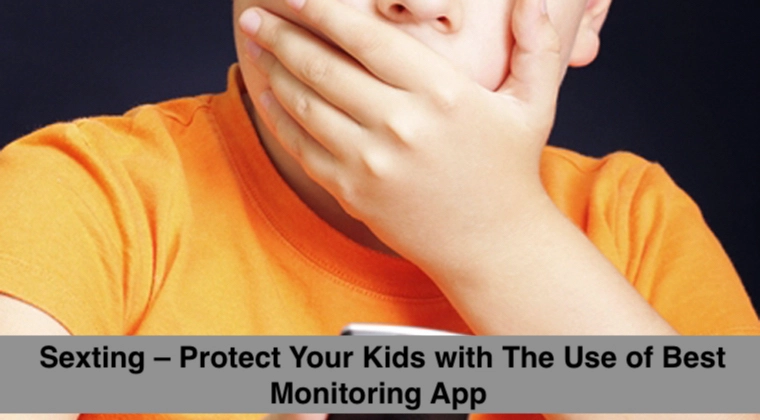Sexting – Protect Your Kids with The Use of Best Monitoring App

In today’s connected age, a new term has become a nightmare for parents: sexting. This refers to the act of sending sexually explicit messages, photos, or videos, predominantly via smartphones. Among teens, it’s an alarmingly common practice, often viewed as a modern extension of flirting. However, the implications of such digital intimacy are vast and can have long-lasting consequences.
Despite being a private activity, when sexting messages go astray, they can become a public nightmare. The rapid growth of this phenomenon has made it clear that monitoring tools are not just helpful, they are essential for the digital world which is filled with potential risks. Parents are turning to a SMS monitoring tool not to invade privacy but to protect the mental and emotional well-being of their children, ensuring their youthful adventures don't turn into lifelong embarrassment and burdens.
Sexting
Sexting involves sending text messages with sexual content, which can include nude or semi-nude images or explicit text. It's an issue of concern for parents because it’s not just prevalent among teens, but it’s also a behavior that many youths don’t fully understand the consequences of. This digital act, done in a moment of trust or impulsivity, can have serious repercussions. If these images or messages become public, it can lead to embarrassment, bullying, and a damaged reputation.
The potential consequences of sexting stretch far beyond a teen's present moment. Legally, underage sexting can lead to severe allegations, including charges related to child pornography. Privacy is another significant concern, once a message is sent, control is lost over where it ends up or who sees it. Emotionally, the fallout from sexting gone wrong can be devastating, leading to anxiety, depression, and in some cases, even self-harm.
Peer pressure often plays a critical role in a teen’s decision to engage in sexting. Teens might feel compelled to conform to what they believe is a widespread practice among their peers. The digital footprint left by sexting is devastating. Unlike spoken words, digital messages are difficult to erase and can resurface at any time, potentially impacting future relationships and opportunities.
How SMS monitoring tool Can Help
Monitoring apps come with a variety of features designed to detect sexting and other risky online behaviors. These include keyword detection, which flags specific words and phrases commonly used in sexting, and image recognition technology that can alert parents to the sharing of explicit photos. Some apps even offer the ability to monitor social media conversations, where a lot of sexting exchanges take place.
However, the use of these apps raises important questions about privacy. Striking the right balance between protecting children and respecting their privacy is crucial. Monitoring should be part of an open discussion between parents and children, establishing a mutual understanding of why it's being implemented. It's about ensuring safety, not breaching trust.
When choosing the right monitoring app, parents should look for features that suit their family’s needs. The app should be easy to use and provide real-time alerts, so parents can act swiftly if necessary. Other critical features may include customizability of filters, comprehensive reporting, and the ability to monitor multiple devices. Compatibility with your child’s device and the family's operating systems is also essential.
Comparing top monitoring apps, parents should examine the extent and intrusiveness of monitoring capabilities. Look for reviews or endorsements from credible sources and check for feedback from other parents. Apps with a good balance of thorough monitoring and respect for privacy should be your top choice. The best SMS monitoring tool not only aids in protection but also supports parents in starting conversations about responsible digital behavior.
Tips for smart parenting to protect kids from sexting
Though the use of monitoring apps is must, but you should also connect with the kids through various acts. Here are some of the tips:
- Start Early: Educate your kids about online safety from a young age.
- Have Open Talks: Discuss what sexting is and its consequences in an age-appropriate way.
- Create Trust: Make sure your kids know they can come to you with any problem, no matter what.
- Teach Consent: Explain the importance of consent, both in giving and receiving photos.
- Set Rules: Have clear family guidelines about internet and phone use.
- Use Technology Aids: Set up monitoring apps to help oversee your child's digital activity.
- Promote Self-Respect: Encourage your kids to value their privacy and personal integrity.
- Be a Role Model: Show them responsible behavior with your own digital habits.
- Stay Informed: Keep up with the latest digital trends and potential risks.
- Encourage Offline Activities: Get your kids involved in hobbies that don't involve screens.
- Know Their World: Be familiar with the apps and platforms your kids use.
- Provide Alternatives: Teach them other ways to express affection and friendship that don't involve sexting.
Actionable Steps if Sexting is Detected
If you find out your child is involved in sexting, stay calm and address the issue directly with them. Have a conversation about the risks and consequences they face. If the content has spread, contact your child's school to discuss a plan of action if other students are involved.
It’s also wise to consult a counselor to support your child's emotional well-being. In situations where legal issues may arise, seek advice from legal authorities to understand the implications and necessary steps. Act quickly but thoughtfully, prioritizing your child's safety and mental health throughout the process.
But you can save your kids from such things by choosing the best parental control apps that can help you to know things at the right time. When you know what is going on with your kid, you can stop it right away thus saving your kid.








